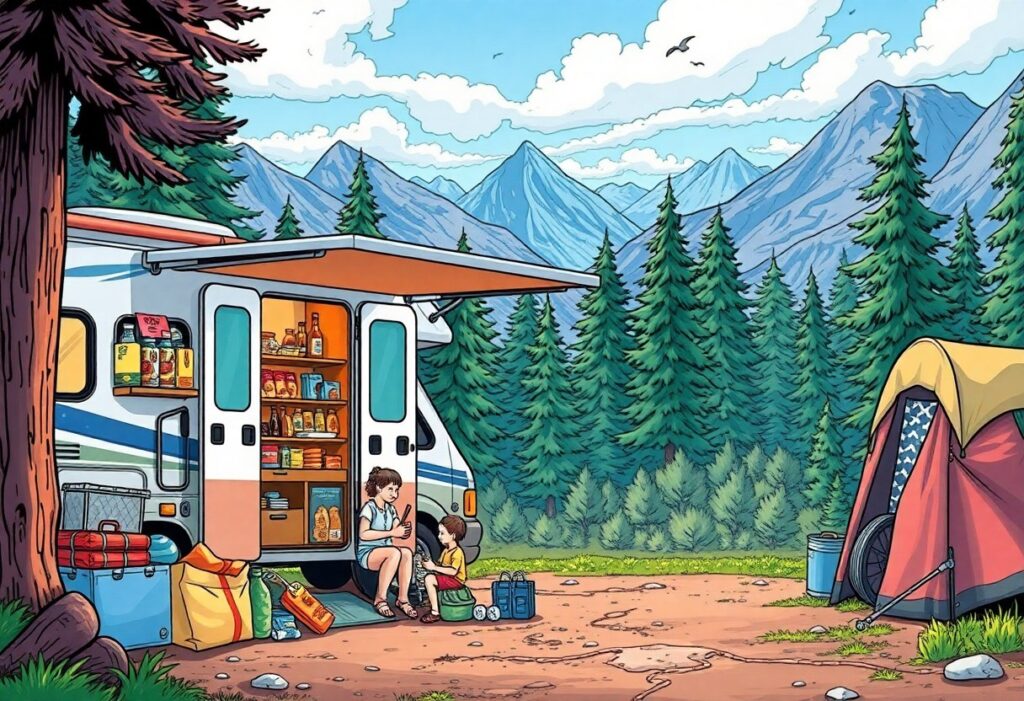There’s nothing quite like hitting the open road in your RV for a camping adventure, and having the right food and snacks can elevate your experience to the next level. From easy-to-make meals to tasty treats, knowing how to stock your RV effectively ensures you’ll be prepared for every appetite. In this guide, you’ll discover practical tips and a smart checklist that will help you pack the importants, so you can focus on enjoying the great outdoors and creating unforgettable memories with friends and family.
How to Plan Your RV Food Stock
Before you hit the road, it’s important to map out your food stock to ensure a smooth camping experience. Start by considering the duration of your trip, as this will greatly influence the quantity and type of food you’ll need. Next, take into account any dietary preferences or restrictions among your party to keep everyone satisfied and nourished during your adventure.
Assessing Your Trip Duration
For every trip, determine how many days you’ll be away from home. This will help you gauge how much food you need to pack. A weekend getaway may call for fewer items, while a week-long camping excursion will require more substantial provisions. Plan for meals and snacks based on your daily schedule and activities.
Considering Dietary Preferences
Stock your RV with food items that accommodate the dietary preferences of everyone in your group. Whether you’re catering to vegetarians, gluten-free diets, or picky eaters, having a variety of options will ensure all campers can enjoy meal times. Consider both fresh ingredients for cooking and snacks that are ready to eat.
Duration of your trip should dictate how much variety you include in your food stocks. If it’s a lengthy stay, consider stocking up on multiple protein sources, tempting snacks, and easy-to-make meals to accommodate different tastes. Having an assortment will not only keep meals interesting but will also ensure that everyone has something they enjoy, enhancing the overall experience of your camping trip.
Tips for Selecting Non-Perishable Items
It’s crucial to choose non-perishable items that are nutritious and satisfying for your camping trip. Consider items that have a long shelf-life, are easy to prepare, and are versatile for various meals. Here are some tips for selecting the right products:
- Check expiration dates
- Opt for nutrient-rich options
- Focus on easy meal preparation
- Choose items with minimal packaging
Thou will find that careful selection will enhance your camping experience.
Canned Goods and Dried Foods
There’s a wide variety of canned goods and dried foods that make excellent options for stocking your RV. Look for canned vegetables, beans, and proteins that can easily be combined for meals. Dried foods like pasta, rice, and grains also provide great sources of energy while being lightweight. These options are space-efficient and require no refrigeration, making them ideal for your journey.
Snacks That Last
To keep your energy levels up while enjoying the great outdoors, select snacks that last throughout your trip. Opt for items like trail mix, granola bars, and beef jerky that are nutritious and can satisfy hunger without spoiling. These snacks are easy to pack and have an excellent shelf-life, making them perfect for long hours on the road or at the campsite.
Plus, having a variety of snacks will help you avoid boredom and provide quick energy during hikes or outdoor activities. Include a mix of sweet and savory options, such as fruit bars, nut butter packets, and crackers, to appeal to different cravings. This variety keeps your camping experience enjoyable and ensures you’re well-fueled for your adventures.
Factors to Consider for Perishable Items
Even when stocking your RV, it’s crucial to pay attention to the perishable items that require specific conditions. As you plan your trip, consider the following:
- Storage space in your refrigerator
- Cooling options during travel
- Duration of your trip and food freshness
- Types of perishables your family enjoys
Any mishap in managing these factors can result in spoiled goods and wasted food, so plan judiciously.
Choosing the Right Refrigerated Foods
Clearly, selecting the right refrigerated foods can enhance your camping experience. Opt for items that have a longer shelf life and can withstand fluctuating temperatures during your trip. Here are some good options to consider:
- Cheeses that don’t need immediate consumption
- Cured meats and sausages
- Condiments in sealed packages
- High-protein options like yogurt and hard-boiled eggs
Fresh Produce Tips
One way to keep your meals vibrant is to include fresh produce. When opting for fruits and vegetables for your trip, focus on durability and versatility. Consider these tips:
- Choose fruits that withstand travel, like apples and oranges
- Pick versatile vegetables such as bell peppers and carrots
- Inspect and discard any damaged items before packing
- Store produce in breathable bags or containers
Recognizing the importance of durable produce will help you enjoy fresh and nutritious meals throughout your camping adventure.
Consider incorporating a variety of colors in your fresh produce to enhance both nutrition and meal appeal. This not only brightens your plate but also aids in maintaining a balanced diet. Including items like leafy greens or hearty root vegetables can extend freshness as well. When packing, ensure to place these items in cool, breathable environments to limit spoilage. Staying mindful about your fresh produce choices will greatly enhance your outdoor cooking experience. Recognizing your family’s preferences and meal planning can make your camping culinary journey a pleasurable one.
How to Create Balanced Meals
Not every meal needs to be gourmet, but a well-balanced diet can enhance your camping experience. Focus on including a variety of proteins, whole grains, fruits, and vegetables in your meals. This will not only keep your energy levels sustained but also make your trip more enjoyable. When planning your menu, consider options that are easy to prepare and store, ensuring you have all the necessary ingredients while keeping it simple.
Planning Meal Ideas
Meals during your camping trip should be easy to make and enjoyable for everyone. Plan out breakfast, lunch, and dinner options ahead of time, including simple recipes that require minimal cooking equipment. Consider meals like oatmeal with fruits for breakfast, sandwiches or wraps for lunch, and one-pot dishes like chili or stir-fry for dinner. Make a shopping list based on your chosen meals to avoid forgetting any vital items.
Incorporating Variety
To avoid meal fatigue on your trip, it’s beneficial to incorporate variety into your food lineup. This can be achieved by rotating different proteins, grains, and vegetables throughout the week. Opt for different seasonings and cooking methods to transform basic ingredients into exciting dishes. For instance, grilling vegetables one day and roasting them another can provide a completely different flavor profile, keeping your meals interesting and satisfying.
Ideas for variety include switching between protein sources like chicken, fish, and plant-based options such as beans and lentils, as well as experimenting with various grains like quinoa, brown rice, and couscous. Incorporate seasonal fruits and vegetables, which can bring freshness and vibrancy to your meals. Don’t hesitate to switch up the recipes; try a taco night one evening and a pasta feast the next. Embracing diversity in your meal choices makes each dining experience memorable, enhancing your overall camping adventure.
Tips for Efficient Packing
Despite the limited space in your RV, smart packing can make your camping trip enjoyable and organized. To make the most of your space, consider the following tips:
- Prioritize non-perishable foods.
- Use stackable containers.
- Group similar items together.
- Label everything for easy access.
Assume that a well-planned packing process will set the tone for a relaxed adventure.
Utilizing Space Wisely
With efficient storage strategies, you can maximize every inch of your RV. Opt for collapsible or multi-functional items whenever possible, and consider using vertical space through shelves or hooks. Pull-out bins or sliding drawers can also help keep your kitchen organized while allowing easy access to your food supplies.
Organizing Your RV Kitchen
Some simple organizational techniques can enhance your cooking experience on the road. Use drawer dividers to keep utensils in place, and allocate specific zones for cooking, prepping, and storing food items.
Wisely organizing your RV kitchen means creating a system that works for you. Consider using clear containers for dry goods and dedicate a shelf for frequently used items, ensuring they are easy to reach. Hooks can be great for hanging pots, pans, or even herbs, while magnetic strips can keep knives secure and accessible. By establishing an organized kitchen, you enhance your overall camping experience, making it seamless and stress-free.
How to Manage Food Storage During the Trip
For an enjoyable camping experience, managing food storage effectively is key. Utilize your RV’s designated fridge, freezer, and pantry space to keep everything organized. Make use of food containers to prevent spills and keep food separated. Regularly check your supplies to ensure you’re eating and using perishable items first, thus minimizing waste.
Keeping Food Fresh
Any effective strategy for keeping your food fresh starts with proper refrigeration. Pack perishable items, such as dairy and meats, toward the back of the fridge where it’s coolest. Additionally, invest in good quality coolers and ice packs for items that won’t fit in the fridge, ensuring they remain chilled throughout your journey.
Avoiding Spoilage
To prevent spoilage, plan your meals carefully and only bring what you need. Opt for non-perishable items like canned goods, pasta, and rice that can last longer without refrigeration. Furthermore, keep an eye on expiration dates and rotate your supplies, so older items are consumed first. This proactive approach will help maintain the quality of your food over the course of the trip.
Trip planning is an opportunity to assess what perishable items you need and prioritize their use. Consider packing items like fruits and vegetables with longer shelf lives and adjusting your meal plan based on the duration of your trip. By strategizing what to bring and how to store it, you help ensure that everything you eat remains safe and delicious.
Conclusion
On the whole, stocking your RV with food and snacks for the perfect camping trip involves thoughtful planning and preparation. You should take into account the dietary preferences of your travel companions, choose non-perishable items for convenience, and include a mix of wholesome meals and delightful treats. By organizing your pantry, making a shopping list, and packing smartly, you ensure that your RV is well-equipped to keep everyone satisfied and energized throughout your adventure. Enjoy your journey and happy camping!

